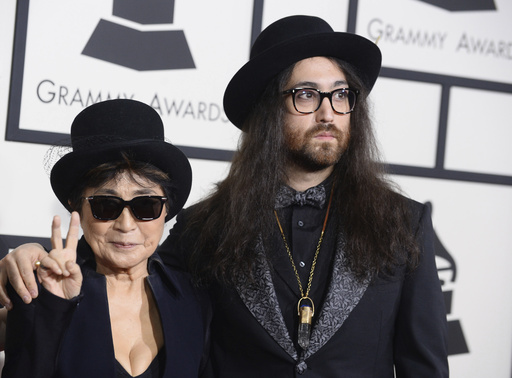NEW YORK — Sean Ono Lennon, recently entrusted with the legacy of his father, John Lennon, is experiencing an impressive surge in recognition. This year, he won an Academy Award for a short film inspired by his parents’ timeless song “Happy Christmas (War is Over)” from 1971. Shortly after, he received his inaugural Grammy nomination for producing a comprehensive box set of the album “Mind Games,” originally launched in 1973.
“It feels overwhelming and surreal,” stated Lennon, who also celebrated a Webby Award alongside his mother, Yoko Ono, for her interactive art initiative “Wish Tree.” Having lost his father at the tender age of 5 after he was tragically murdered in 1980, Sean uses his creative endeavors to forge a deeper connection with John Lennon. His artistic endeavors transcend merely keeping the music alive, as he transforms the original recordings of John’s works into unique creations.
Influenced by fellow Beatles descendant Dhani Harrison, who revitalized his father’s “All Things Must Pass,” Lennon has drawn from that experience for his own projects. While Harrison is also reissuing his dad’s “Living in the Material World” this fall, Sean’s work on “Mind Games” takes a different artistic approach.
The innovative box set mirrors one of Yoko’s art installations and contains reproductions of artwork, hidden audio tracks, videos, messages, and puzzles, some of which require a UV light to unveil. Priced at $1,350, it does have more affordable alternatives for interested fans.
Sean, now 49, reflects on what his father’s music meant to him growing up. While he accompanied John to studio sessions during the making of “Double Fantasy,” it wasn’t until later in life that he grasped the profound impact John had on fans. Sean recounted moments of hearing admirers sing his father’s songs outside their home on October 9, their shared birthday, noting that such experiences were unique to his life.
With his father’s music permeating his childhood, learning to play those songs inspired him to pursue a musical career. He remarked that had he grown up with John around, he might have rebelled against his parents’ artistic legacy, but the absence left him cherishing the music deeply as an enduring connection to his father.
Upon Yoko’s retirement from overseeing his father’s music, Sean embraced the role of ensuring John’s art resonates with newer generations. In the liner notes for “Mind Games,” he articulated that “the only meaningful way that I can show my love to him” is by dedicating himself to preserving and promoting his father’s musical contributions.
His sense of familial respect originates from Yoko, and he recalls his grandparents’ arrival in the United States being celebrated akin to a presidential visit. Upon delving into the “Mind Games” project, Sean discovered that the album was not held in high esteem upon its release, as John himself cited it as a shift from activism back to music. While the title track found success, the rest faced critiques and neglect.
Such perspectives only fueled Sean’s determination to encourage a renewed appreciation for “Mind Games.” He acknowledged that the original release suffered from inadequate promotion and live support and described the initial mix as lacking depth. Therefore, he sought to reconstruct the songs using the original recordings, aiming for a richer sound reminiscent of the “Plastic Ono Band” album.
When reinterpreting these tracks, Sean opted for fresh arrangements, occasionally highlighting different instruments. For instance, in his new rendition of “Aisumasen (I’m Sorry),” he sought to evoke emotions aligning with John’s personal struggles during a turbulent period in his marriage to Yoko. These artistic choices demonstrate Sean’s commitment to breathing new life into his father’s music.
Conversely, while some individuals may view his approach as risky, Sean argues that it is essential for him to trust his instincts to do justice to the music. He emphasizes that fans seeking the original versions can still access them readily.
“It’s very forensic work,” Sean explained, revealing that his primary focus lies in honoring his father and understanding the intricacies of his music more thoroughly than any other artist. He has cultivated a connection with his father’s vulnerabilities, recognizing the humanity conveyed in John’s music, which inspires his own creative efforts today.
Looking ahead, Sean plans to revive his father’s “One to One” concerts and reissue the “Walls and Bridges” album. Meanwhile, he recently released his own studio work, “Asterisms.” Although early in his career, he was hesitant to embrace comparisons to his father, now he confidently explores his musical identity without inhibitions.
“I didn’t embark on a musical journey due to inherent talent,” he reflected, “but through the desire to connect with my father via his music.”




